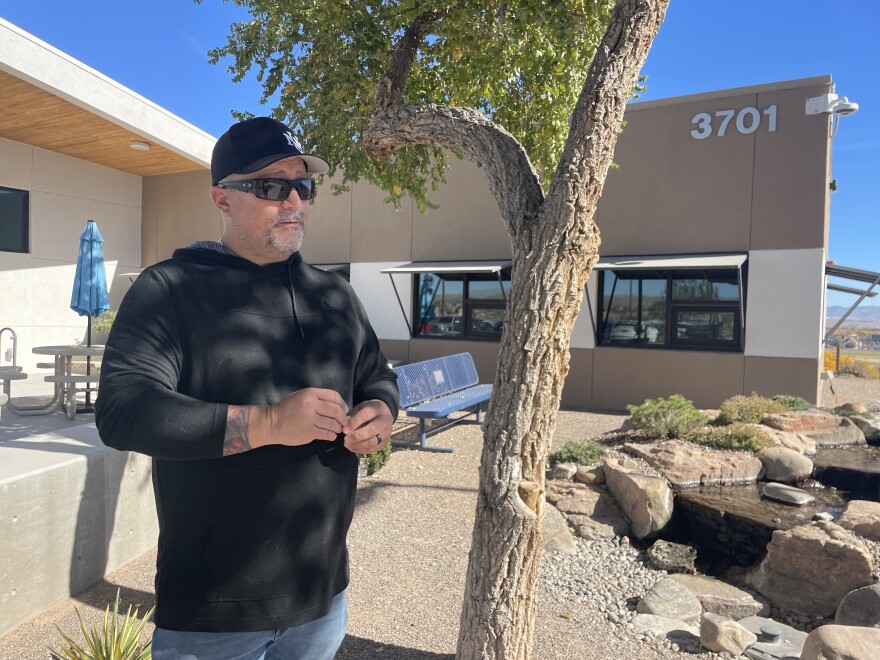Joslyn Herrera is 29 and works with people recovering from addiction in Santa Fe.
She became addicted to painkillers at about 13 and moved on to heroin at 18. In that time, she also had her first experiences with detention.
“There was a few times that I have gone in for shoplifting or running away from the cops,” she said.
She would usually go for a night at a time to a detention center in Northern New Mexico, and said the most she spent there was two weeks. She is part of the 70 to 80% of people incarcerated as children who go on to be reincarcerated as adults.
She said recovery didn’t happen for her in detention.
“It was a horrible experience, especially having to go through the withdrawals being locked and confined in a place where they treat you disrespectfully,” Herrera said.
Herrera said her turning point was causing a car accident that ended in a stranger’s death in 2019. She was then put into her grandparents’ care and got treatment.
“Probation officers or pretrial officers, they want to help them, but at a young age, you should be offering them more support than putting them in a detention center,” she said.
Governor Michelle Lujan Grisham’s September public health order didn’t only call for a ban on open and concealed carry of firearms. It also has several measures aimed at reducing illegal drug use in adults and young people.
With it, she suspended a system that evaluates whether a young person who is arrested is a danger to themselves and others, and should await their trial in detention.
That means more people are going to jail who wouldn’t have. Nearly a third of the 87 young people detained between September and November would’ve stayed home before the order.
In a September interview with KUNM, the governor said detention could help young people dealing with addiction.
“Fentanyl use on our streets and alleys and neighborhoods is illegal today. Take a look at the arrest records for that. They're pretty paltry, and that's often the way that you get, particularly a young person or a young adult, to be able to accept treatment,” she said.
In an email exchange with KUNM, the governor’s office did not provide data to back up that statement or any changes made through the public health order to the juvenile justice system.
The public health order mandates that Managed Care Organizations come through with a placement for treatment within 24 hours of a request, but whether there’s enough treatment services is another question. A 2020 report from the Department of Health says only a third of New Mexicans struggling with addiction were getting treatment.
Dr. Matthew Aalsma is a professor of Pediatrics at the Indiana University School of Medicine and has studied addiction in young people around the country.
“We know that we can’t simply pull all of them out of the community because some of the young people aren’t involved in the justice system at all,” Aalsma said.
And besides that, he said detention rarely motivates young people struggling with addiction.
“For many adults that really care about children, we feel the only way to protect a young person and to show them that what they're doing is going to be harmful to them is to take them out of the community and just kinda scare them,” he said.
But, Aalsma said, that young person still has to go back to their regular life with all its ups and downs shortly after.
“A much better approach to help a young person get into treatment is to make that referral in the community to use resources in the community to motivate that young person to show up and to engage,” he said.
At the Bernalillo County Youth Services Center, staff does provide young detainees medical and psychological services. But Veronica Crespine, a registered nurse, said it’s challenging because young people are usually there for only brief periods of time.
“We try to be mindful and get parents’ buy-in because if we send a juvenile home and parents are against it, then we’re not going to have that continuation or continuity of care,” she said.
She also said that the center connects young people and their families with a program at the University of New Mexico that provides wrap-around services.

David Burke is a co-founder of Serenity Mesa, a private youth recovery facility in Albuquerque.
“We've got an unobstructed view of the entire city. All the leaves are changing right now. They’re gold, yellow, green,” he said from the back porch of the center.
Burke said most kids who come through here have been in detention.
The program here includes therapy, as well as lessons on how to get an ID, write a resume, and other life skills.
“You put somebody in jail, you don't treat any of that stuff,” he said. “You don't treat a way to get a job and to find a different way of doing things. Then, you send them back out to the same place that they were, doing the same things that they were doing, in the same environment, in the same situation. They’re going to do the same things.”
He said programs like this that help kids learn life skills over time are more likely to help recovery stick. But at the same time, he said the work they do is expensive, which also means it’s limited.
“I would put out a hundred beds in this place if I could, and I feel we could fill them,” he said.
For now, there’s just 14.
This coverage is made possible by the W.K. Kellogg Foundation and KUNM listeners.





